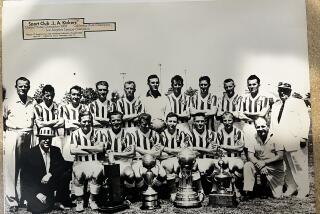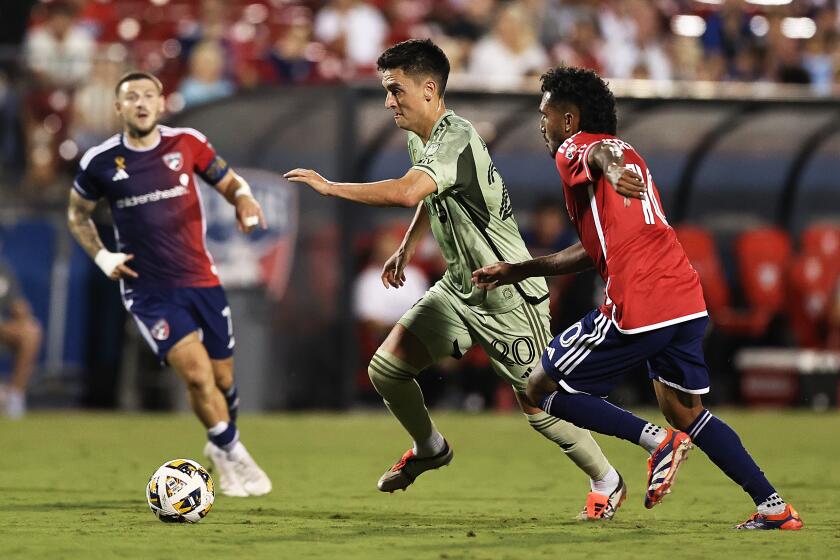U.S. fans’ reaction matters for the future
What will you do, America, if your team implodes Wednesday?
What will you do, America, if Algeria runs the U.S. not only out of Pretoria but all the way out of the World Cup?
Will you care? Will you cry? Or will you simply shrug and say, “That’s soccer,” and move along to something else?
Your reaction matters. It matters to all 23 players who will be on the field and on the bench Wednesday afternoon at 107-year-old Loftus Versfeld Stadium.
It matters to the coaches who have spent four years trying to build this team.
Most of all, it matters to those who later will step up onto the World Cup stage — at Brazil 2014, at what is likely to be England 2018, at what could well be U.S. 2022.
The game is about today, but it is also about tomorrow. If one loss, one disappointment, turns you away from the sport, America, then further disappointment awaits. Remember, 31 teams will not win this World Cup.
The players who will be wearing the U.S. jersey in 12 years’ time are in elementary, junior high or high school now. They are your children, the youngsters who are electronically glued to South Africa 2010 via radio, television, the Internet and assorted other gizmos that we won’t even pretend to understand.
They are the viewers and listeners and readers who believed on Friday night that even though the U.S. was two goals down to Slovenia, it could come back and get a tie or a win. They are the ones who believe in what Landon Donovan or Tim Howard or Clint Dempsey or, heaven help us, even Michael Bradley, have to say.
“Our team spirit has always been a strong point and will continue to be,” Donovan said Monday afternoon in Irene, where the U.S. squad is based. “In the second half the other night, we simply refused to let our World Cup end. The guys united to do something special.”
The accomplishment of the 2-2 tie with Slovenia was largely lost in the controversy over whether Malian referee Koman Coulibaly had cheated the U.S. by disallowing a potential game-winning goal.
The furor of that debate involved no small degree of racism. Witness the misguided souls who, without any basis in fact, argued that the man from Mali must be Muslim and, as such, would have wanted the U.S. not to win to help neighboring Algeria.
Such idiocy needs no comment.
What soccer in America needs are the youngsters who delight in such things as Portuguese star Cristiano Ronaldo’s goal Monday, when he caught the ball on the back of his neck, carried it a step or two forward, dropped it into his path and then lashed it into the back of the North Korean net.
That was part of a 7-0 Portugal victory that will have gone over exceptionally well on Ronaldo’s native island of Madeira but not so well in Pyongyang, which is a different kind of island altogether.
The watching youngsters — at least those with designs on a refereeing career — might also have noted that blatant handball fouls sometimes go unpunished. French referee Stephane Lannoy showed how in Sunday night’s Brazil-Ivory Coast match.
Brazil’s Luis Fabiano controlled the ball twice with his hand and arm before scoring. Ivory Coast Coach Sven-Goran Eriksson was livid about it. “It difficult enough to cope with Fabiano but even more difficult if he is allowed to use his hands,” he said.
Argentina’s Diego Maradona got into the act Monday. “Fabiano’s goal was not with the ‘Hand of God,’ ” the Buenos Aires Herald quoted him as saying. “No, this one was with his arm.”
This is not to advocate that the U.S. try a few tricks Wednesday in the hope of deceiving the referee. It is merely to indicate that calls can go any which way.
“We’ve all played in enough games where those things happen,” Donovan said, “and through the course of your career they tend to even out. . . . It happens. You get on with it.”
So what will you do, America, if your team wins Wednesday? If the U.S. runs Algeria not only out of Pretoria but all the way out of the World Cup?
Will you cheer? Will you celebrate? Will you come back for more, and then back again? Because that’s what it will take if one day you want to be taken as seriously on the soccer field as, say, Argentina or Brazil.







